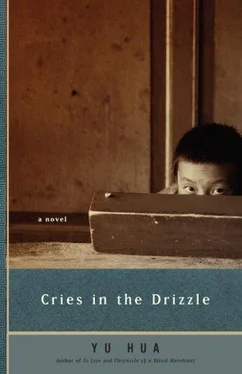Early the next morning Li Xiuying set off for her maternal home. The sky was still dark when I was shaken awake. In the bright lamplight I saw a face mask looming over me, the body attached to it tightly encased in thick layers of clothing, and I was so startled that I gave a wail. Then I heard Li Xiuying's voice emerge from the mask. “Don't cry, don't cry. It's me.”
Li Xiuying must have been pleased with the effect achieved by her disguise, for she said to me triumphantly, “You didn't recognize me, did you?”
In my five years in Littlemarsh, this was the first time Li Xiuying had left the house. On a morning before the advent of winter Li Xiuying walked off in her winter clothes toward the steamboat wharf, and I struggled along in her wake, lugging one of her little stools.
Before daybreak the streets were quite deserted, apart from the occasional old man coughing heavily on his way to morning tea. Li Xiuying was not strong enough to walk more than a hundred yards at a time, and when she stopped to catch her breath I promptly set the stool down underneath her bottom. Thus we proceeded through the damp morning breeze, walking and stopping in turn. Once or twice I was about to say something, but she would cut me off with a quick “Shh!” and whisper, “Not a word, or you'll give me away.”
Her cloak-and-dagger manner gave me the jitters.
It was in this atmosphere of simulated mystery that Li Xiuying left Littlemarsh. What seemed to me then an interminable walk to the wharf is now reduced in my memory to just a few brief scenes. As this strange woman in her bulky clothes cleared the ticket inspection, she turned and waved. I pressed up against the ramshackle waiting-room window and watched as she stood uncertainly on the bank. She needed to cross a narrow gangplank to board the boat, and now she abandoned all precautions, heedless of whether this might blow her cover, and called out, “Can someone help me across?”
When she stepped inside the cabin, that was the last I saw of her. I stayed glued to the window until the boat sailed into the distance, where the river disappeared out of sight. It was only then that I confronted a terrible reality: what was I to do?
Li Xiuying had forgotten me. Through sheer grief, she had put everything apart from herself out of her mind. At the age of twelve, as dawn approached, I was an orphan.
I didn't have a penny in my pocket; my clothes and satchel were locked inside the house, and I did not have a key. My sole possession was the little stool that Li Xiuying had left behind. I slung it up on my shoulder again and left the wharf, sobbing.
Out of habit I went back to the house, but when I pressed my hand against the unyielding door all I succeeded in doing was making myself more miserable. I slumped down outside the door, crying as though my heart would break, and then sat there in a daze, my mind drained of thought, until Liu Xiaoqing came along on his way to school, when I burst into tears again. Our relations now mended, I held nothing back: “Wang Liqiang is dead and Li Xiuying has gone away! There's no one to look after me.”
Liu Xiaoqing was still wearing his black armband. “Come and stay at my house!” he cried with impulsive generosity. “You can sleep in my brother's bed.”
He ran back to his house, quick as a flash. But after a couple of minutes he returned, wearing a hangdog expression. Not only had his invitation been vetoed by his parents but he had received a tongue-lashing as well. He gave me an embarrassed smile. That's when I decided I would go back to Southgate, to be with my parents and my brothers. I told Liu Xiaoqing my plan, but added that I didn't have money for the boat fare.
His eyes lit up as he cried, “Borrow the money from Guo-qing!”
We found Guoqing on the school playground. When Liu Xiaoqing called him, he said, “I'm not going over there — you've got hepatitis.”
“How about if we come over where you are?” Liu Xiaoqing said pitifully.
Hearing no objection, we walked over to the boy with the deep pockets. Were it not for Guoqing's beneficence, I don't know how I would have made it back to Southgate. My two childhood playmates saw me to the boat that would take me away from Littlemarsh, and as we walked to the wharf Guoqing said to me airily, “If you're short of money in the future, just drop me a note.”
Liu Xiaoqing trailed along a step or two behind, an uncomplaining porter, the stool propped against his shoulder. But in the end I forgot to take it along, just as Li Xiuying had forgotten to take me. When the boat pulled away I saw Guoqing sitting cross-legged on the stool, waving to me, while Liu Xiaoqing stood next to him, saying something into his ear. The wharf and the embankment on which it rested quickly disappeared from view.
Late that autumn afternoon I stepped onto my native soil. Returning after five years away I asked directions to Southgate in an outsider's accent. As I began to walk toward the little road that would take me there, a child much younger than me stuck his nose against an upstairs window and called, “Kid! Hey, kid!”
To my ears, these words sounded like an exotic dialect. Fortunately I still remembered Southgate, and my parents’ and siblings’ names, and my grandfather's too. Memories from when I was six helped me sense which way to go, stopping occasionally to check with passersby That was when I met my grandfather Sun Youyuan, with his bundle on his back and clutching his oilskin umbrella to his chest. He had just spent a month at my uncle's and was on his way back to Southgate. Now in his final years, my grandfather lost his way on the one road that should have been most familiar to him, and it was there we met, although neither of us recognized the other.
At this point I had put the county town behind me, and the countryside lay ahead. At a crossroads I was unsure how to proceed. But I did not immediately feel anxious, because I was entranced by the sunset. Rolling black clouds were gradually flooded with crimson light; a red globe had settled on the distant horizon and was beginning its luminous descent. I stood in the glow of the setting sun, yelling, “Down, down!” A huge black cloud was moving toward the western sky, and I didn't want to see it swallow up the setting sun.
Only after the sun obligingly sank from view did I notice my grandfather Sun Youyuan. He was standing behind me, just a few inches away. He looked at me imploringly, and when I asked him, “Which way to Southgate?” he shook his head and mumbled, “I forgot.”
He forgot? I thought this a curious answer and said to him, “If you don't know, then why don't you just say so? What do you mean, you forgot?”
He smiled apologetically The sky was now beginning to darken, so I chose one road at random and hurriedly set off. After a while I realized that the old man was following me, but I paid him no attention. A little farther on, I saw a woman with a scarf on her head bent over in a field and asked her, “Is this the way to Southgate?”
“You're going the wrong way.” She straightened herself and said, “You should have taken that other road.”
By now it was almost dark, so I turned around abruptly and headed back. The old man did the same, and his eagerness to stay with me began to get on my nerves. I took to my heels and ran, and when I looked back I could see him staggering along in a desperate effort to keep on my tail. This made me angry, and when he came a bit closer I said to him, “Hey, stop following me! Go some other way.”
When I got back to the intersection, it was now completely dark. I could hear thunder; there was not even a hint of moonlight at this point. I groped my way to the other road and took several quick paces in that direction, only to find the old man still behind me. I turned around and yelled, “Stop following me! My family's got no money, and we can't afford to support you.”
Читать дальше












